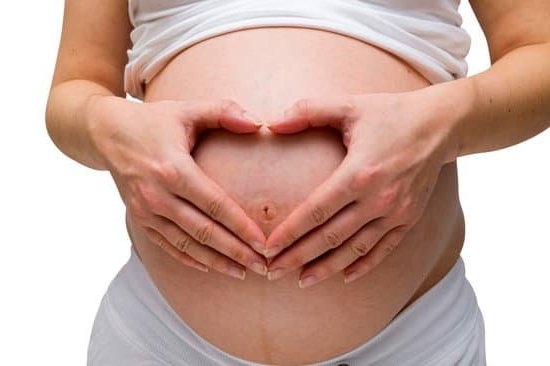An ectopic pregnancy occurs when a fertilized egg implants and grows outside the main cavity of the uterus. This can result in serious complications if not addressed promptly. In this article, we will explore the natural resolution process of an ectopic pregnancy, shedding light on the body’s role in managing this complex reproductive condition.
Ectopic pregnancies are often caused by conditions that disrupt or slow the movement of a fertilized egg through the fallopian tube to the uterus, such as scarring from a previous surgery or infection. Statistics show that approximately 1-2% of all pregnancies are ectopic, with a higher incidence rate in women above the age of 35 and those who have had a history of pelvic inflammatory disease.
Recognizing the signs and symptoms of an ectopic pregnancy is crucial for early detection and intervention. From abdominal pain to abnormal vaginal bleeding, understanding these warning signs can help individuals seek timely medical attention to prevent potential risks and complications associated with ectopic pregnancies.
Signs and Symptoms of Ectopic Pregnancy
An ectopic pregnancy occurs when a fertilized egg implants outside the uterus, most commonly in the fallopian tube. This medical condition is considered a potentially life-threatening situation for pregnant women and requires immediate medical attention.
The signs and symptoms of an ectopic pregnancy can be subtle at first, making it crucial for individuals to be aware of potential warning signs. These can include abdominal or pelvic pain, vaginal bleeding, shoulder pain, dizziness, or fainting. It is important to note that not all women will experience these symptoms, and some may have no symptoms at all, which makes early detection through routine prenatal care essential.
If left untreated, an ectopic pregnancy can lead to serious complications such as rupturing of the fallopian tube and internal bleeding. This can jeopardize the health and even the life of the pregnant individual. Therefore, any woman experiencing potential symptoms of an ectopic pregnancy should seek medical attention promptly.
Additionally, understanding the potential risks and complications associated with an ectopic pregnancy is crucial for raising awareness about this condition. By recognizing the signs early on and seeking appropriate medical care, individuals can mitigate the potential dangers associated with an ectopic pregnancy.
| Signs and Symptoms | Ectopic Pregnancy Risks |
|---|---|
| Abdominal or pelvic pain | Rupture of fallopian tube |
| Vaginal bleeding | Internal bleeding |
| Shoulder pain | Potential life-threatening situation |
Diagnosing Ectopic Pregnancy
Ectopic pregnancy refers to a potentially life-threatening condition in which a fertilized egg implants and grows outside of the uterus, often in the fallopian tube. The incidence of ectopic pregnancy has been on the rise in recent years, with approximately 1-2% of all pregnancies being ectopic. It is important to understand the signs and symptoms of ectopic pregnancy, as well as the various methods used for diagnosis to ensure prompt medical intervention.
One of the most common signs of an ectopic pregnancy is abdominal or pelvic pain, often accompanied by vaginal bleeding. Additionally, other symptoms such as shoulder pain, dizziness, and fainting may also occur.
These warning signs should not be ignored, especially among women who are at higher risk for ectopic pregnancy due to factors such as a history of pelvic inflammatory disease, previous ectopic pregnancies, or tubal surgery. Early detection through proper diagnosis is crucial in preventing complications and ensuring appropriate treatment.
To diagnose an ectopic pregnancy, healthcare providers typically perform a combination of medical tests and examinations. These may include transvaginal ultrasounds to visualize the reproductive organs and confirm the location of the developing pregnancy, as well as blood tests to measure levels of the hormone hCG (human chorionic gonadotropin). In some cases, laparoscopy-a minimally invasive surgical procedure-may be necessary to directly observe and diagnose an ectopic pregnancy.
It is essential for individuals experiencing symptoms associated with ectopic pregnancy to seek medical attention promptly. Early detection can greatly impact the success of treatment options and minimize potential risks. By understanding how an ectopic pregnancy is diagnosed and recognizing its signs and symptoms, individuals can take proactive steps towards seeking necessary medical care.
Treatment Options for Ectopic Pregnancy
When it comes to the treatment of ectopic pregnancy, there are a few different options available, depending on the specific circumstances of the individual. Here are some of the typical treatment options for ectopic pregnancy:
- Medications and non-surgical approaches: In some cases, a medication called methotrexate may be used to stop the growth of the embryo and allow the body to absorb the pregnancy tissue. This approach is often used when the ectopic pregnancy is detected early and has not yet caused severe symptoms.
- Surgical intervention and its implications: If an ectopic pregnancy has progressed or if there is a risk of rupture, surgery may be necessary to remove the pregnancy from the fallopian tube or other location. This could involve laparoscopic surgery, where a small incision is made in the abdomen, or traditional open surgery in more severe cases.
In addition to these medical interventions, it’s important to understand how an ectopic pregnancy can resolve itself without medical intervention. The body has natural processes that can lead to the resolution of an ectopic pregnancy under certain conditions.
One way that an ectopic pregnancy can resolve itself is through a process called tubal abortion, where the body reabsorbs the products of conception without causing significant symptoms. Another possible outcome is when the fertilized egg resolves on its own and causes minimal harm to the woman’s health.
Understanding how does an ectopic pregnancy resolve itself also involves considering factors that influence this natural resolution process. These factors can include early detection, the location and size of the ectopic pregnancy, as well as individual variations in response to hormonal changes. While it’s crucial to seek medical attention for any concerns regarding ectopic pregnancy, it’s also valuable to recognize that in some cases, the body may be able to naturally resolve this condition.
The Role of the Body in Resolving Ectopic Pregnancy
Understanding the Body’s Natural Processes
When an ectopic pregnancy occurs, the body initiates a series of natural processes to resolve the issue. In many cases, the fallopian tube where the embryo is implanted will rupture, causing internal bleeding. This triggers the body’s response to stop the bleeding and absorb the blood that has already been released into the abdominal cavity. The body then breaks down and reabsorbs the tissue from the ectopic pregnancy over time.
How the Body Responds to the Presence of the Ectopic Pregnancy
The body’s immune system also plays a role in resolving an ectopic pregnancy. The immune response is triggered when there is a foreign object, in this case, an embryo, located outside of the uterus. This can lead to inflammation as the body tries to address this abnormal situation. In some cases, this immune response can contribute to pain and discomfort experienced by individuals with an ectopic pregnancy.
Factors That Influence the Resolution of the Ectopic Pregnancy
Several factors can influence how an ectopic pregnancy resolves itself within the body. The size and location of the ectopic pregnancy can impact its resolution.
Additionally, individual variations in hormone levels and immune responses may also play a role in how quickly or effectively an ectopic pregnancy is resolved within the body. It’s important for individuals experiencing symptoms of an ectopic pregnancy to seek medical attention promptly to prevent complications that may arise if it does not resolve on its own.
Overall, understanding how an ectopic pregnancy resolves itself can help individuals recognize when they need medical intervention and ensure they receive timely treatment for this potentially life-threatening condition.
How Does an Ectopic Pregnancy Resolve Itself
Ectopic pregnancy is a potentially life-threatening condition that occurs when a fertilized egg implants and begins to grow outside the uterus. This often happens in the fallopian tube, but can also occur in other areas such as the cervix, ovary, or abdominal cavity. The most common cause of ectopic pregnancy is damage or blockage in the fallopian tubes. Statistics show that ectopic pregnancies occur in approximately 1 out of every 50 pregnancies.
When an ectopic pregnancy occurs, the body does have the ability to resolve it on its own in some cases. This natural resolution process usually involves the body reabsorbing the pregnancy tissue without the need for medical intervention. However, how does an ectopic pregnancy resolve itself exactly?
The process of how an ectopic pregnancy resolves itself can vary from person to person and depends on several factors such as the location and size of the pregnancy, as well as individual health considerations. In some cases, if the fertilized egg is small and there are no signs of rupture or severe bleeding, the body may be able to naturally reabsorb it over time.
However, it’s important to note that this process can sometimes take several weeks and may require close monitoring by a healthcare professional to ensure that it resolves safely. In other instances, an ectopic pregnancy may not resolve on its own and could lead to serious complications if left untreated.
Potential Complications and Risks
An ectopic pregnancy can pose several potential complications and risks for the individual experiencing it. One of the most serious complications is the risk of rupture, which can lead to severe internal bleeding and necessitate emergency medical intervention. This life-threatening situation requires immediate surgical treatment to address the rupture and prevent further health complications. Additionally, if left untreated, an ectopic pregnancy can result in damage to the fallopian tubes, potentially affecting future fertility.
Another potential complication of an ectopic pregnancy is the emotional toll it can take on individuals. Dealing with the loss of a pregnancy, along with the physical and emotional stress of undergoing treatment, can be overwhelming. It’s important for individuals experiencing an ectopic pregnancy to seek support from healthcare professionals, as well as friends and family, in order to navigate the emotional impact of this difficult experience.
In terms of future fertility and pregnancy considerations, individuals who have had an ectopic pregnancy may be at a slightly increased risk for experiencing another ectopic pregnancy in the future. However, with proper medical care and monitoring during subsequent pregnancies, many individuals are able to have successful pregnancies following an ectopic pregnancy.
It’s essential for those who have experienced an ectopic pregnancy to communicate openly with their healthcare providers about their concerns and any future plans for starting or expanding their family.
Aftercare and Recovery
After experiencing an ectopic pregnancy, it is important for individuals to focus on their physical and emotional recovery. This section will discuss the various aspects of aftercare and recovery, as well as the support resources available for those who have gone through this challenging experience.
Following the resolution of an ectopic pregnancy, the body will need time to heal. Depending on the treatment approach, individuals may experience physical discomfort such as pain or fatigue. It is crucial to follow the post-treatment instructions provided by healthcare professionals, including any necessary medication or restrictions on physical activities.
In addition to physical healing, individuals who have dealt with an ectopic pregnancy may also require support for their emotional well-being. The loss of a pregnancy, along with the emotional distress caused by an ectopic pregnancy diagnosis and treatment, can take a significant toll on mental health. Seeking counseling or therapy can be beneficial in processing feelings of grief and trauma associated with this experience.
Follow-Up Care and Support Resources
Aftercare for ectopic pregnancy involves regular follow-up appointments with healthcare providers to monitor recovery progress and address any lingering concerns. Additionally, support groups and online communities can provide valuable emotional support and practical advice from others who have gone through similar experiences. Seeking out these resources can help individuals navigate the challenges of aftercare and recovery following an ectopic pregnancy.
By prioritizing both physical and emotional healing, individuals can gradually rebuild their strength and resilience following an ectopic pregnancy. It is important for those affected by this condition to remember that they are not alone in their journey toward recovery, and that there are resources available to help them through this difficult time.
Conclusion
In conclusion, an ectopic pregnancy can be a complex and potentially dangerous condition that requires prompt medical attention. Understanding the signs and symptoms, as well as the diagnostic and treatment options available, is crucial in addressing this issue effectively. Additionally, recognizing the body’s natural processes and how an ectopic pregnancy may resolve itself is important in comprehending the potential outcomes of this condition.
While there are various factors that can influence the resolution of an ectopic pregnancy, it is essential to highlight that early detection and medical intervention are key in ensuring the best possible outcome. The natural resolution process may not always occur on its own, and leaving an ectopic pregnancy untreated can lead to severe complications such as rupture or internal bleeding. Therefore, seeking professional medical assistance is imperative for anyone experiencing symptoms or concerns related to ectopic pregnancy.
In summary, ectopic pregnancy poses significant risks and complications, but with timely diagnosis and appropriate medical care, favorable outcomes are possible. It is critical for individuals to be aware of the warning signs and seek help promptly if they suspect they may have an ectopic pregnancy. By understanding how an ectopic pregnancy can resolve itself and being proactive in seeking medical support, individuals can better navigate this challenging situation for their health and well-being.
Frequently Asked Questions
Can Ectopic Pregnancy Go Away on Its Own?
Ectopic pregnancy cannot go away on its own and typically requires medical treatment. If left untreated, it can result in serious complications, including a ruptured fallopian tube.
Can Ectopic Pregnancy Resolve Spontaneously?
In some rare cases, ectopic pregnancies may resolve spontaneously without medical intervention. However, this is not the norm and most cases require medical treatment to prevent potential life-threatening complications.
How Does the Body Get Rid of Ectopic Pregnancy?
The body does not naturally get rid of an ectopic pregnancy. Typically, the pregnancy must be removed using medication or surgery to prevent damage or rupture to the fallopian tube. This is why prompt medical intervention is crucial in cases of ectopic pregnancy.

Welcome to my fertility blog. This is a space where I will be sharing my experiences as I navigate through the world of fertility treatments, as well as provide information and resources about fertility and pregnancy.





